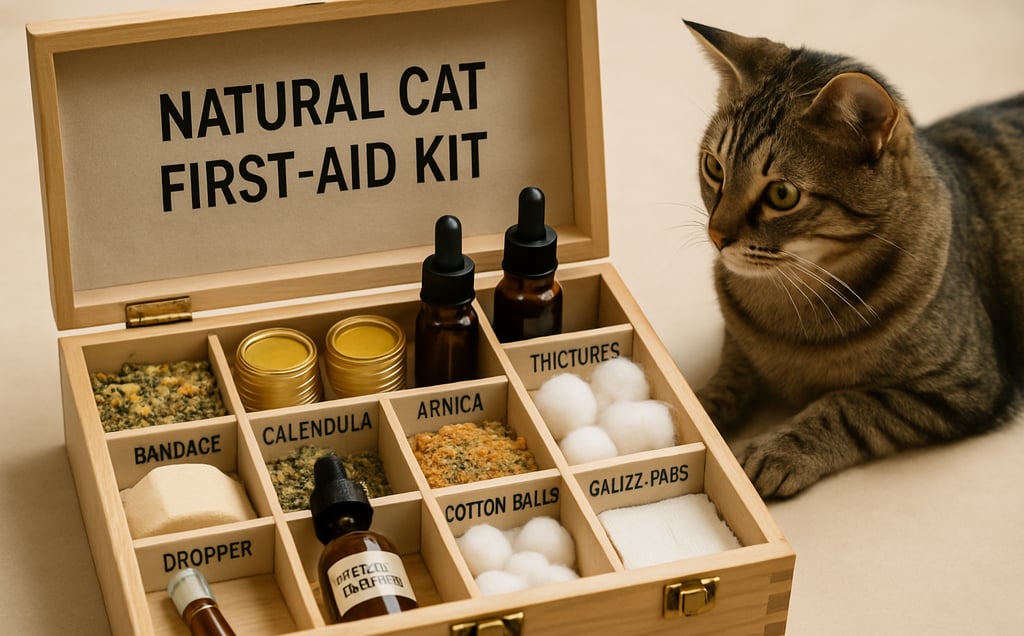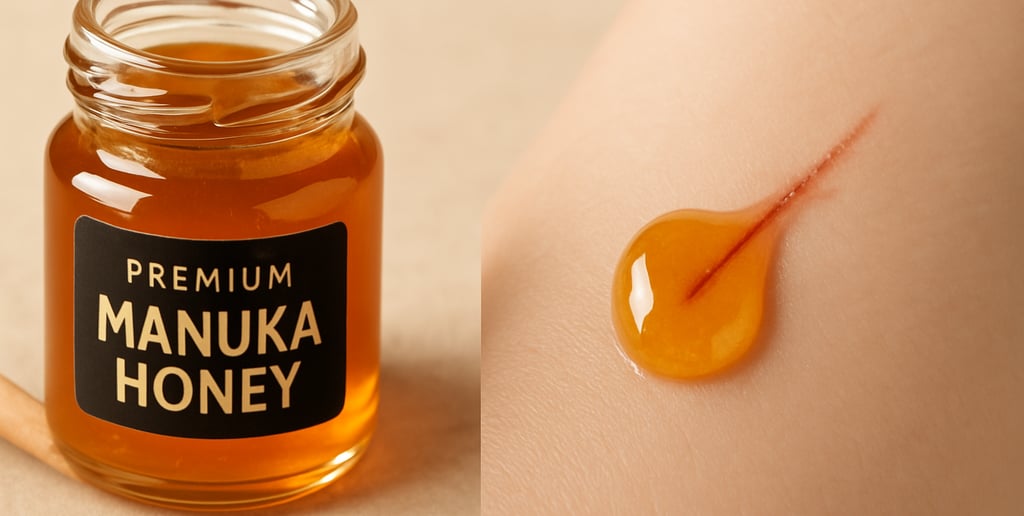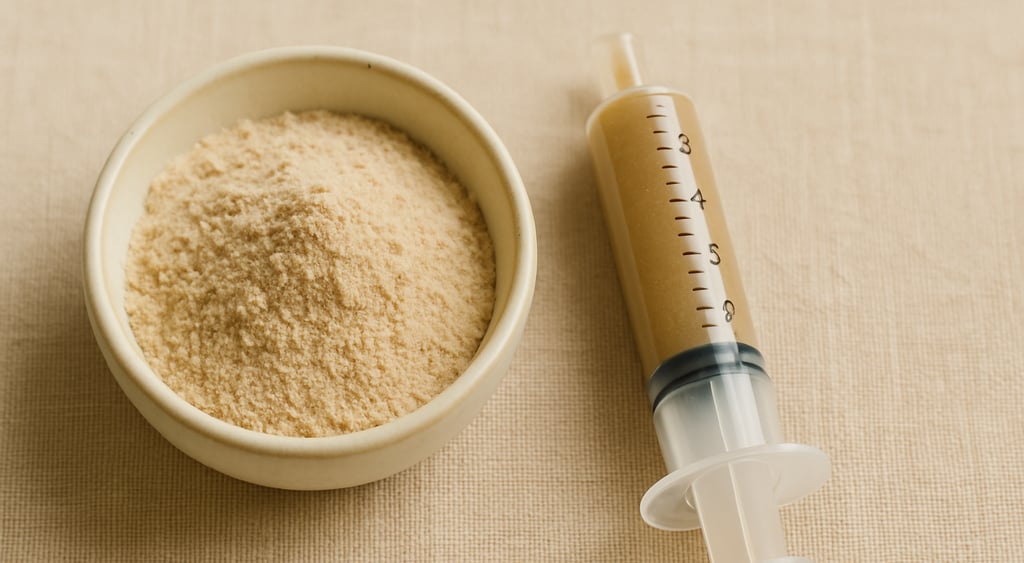5 Must-Have Natural Items for Your Cat's First-Aid Kit
SAFE & NATURAL CARE FOR MINOR EMERGENCIES


Being prepared for minor cat emergencies doesn't mean filling your cabinet with harsh chemicals. This guide explores essential natural items that every eco-conscious cat parent should have on hand for those unexpected moments.
As responsible cat parents, we want to be prepared for those unexpected scratches, minor digestive upsets, or anxious moments our feline friends might experience. While a conventional first-aid kit certainly has its place, incorporating natural remedies can provide gentle, effective care for minor issues while aligning with your eco-conscious values.
This article highlights five essential natural items that deserve a place in your cat's first-aid kit. These versatile remedies can address multiple minor concerns while minimizing environmental impact and reducing your cat's exposure to synthetic chemicals.
1. Manuka Honey: Nature's Wound Healer
Manuka honey isn't just another sweetener – it's a powerful natural remedy with remarkable healing properties. Produced by bees that pollinate the Manuka bush in New Zealand, this special honey contains unique compounds that set it apart from regular honey.
Benefits for Cats:
Antimicrobial Properties: Manuka honey contains methylglyoxal (MGO), which gives it potent antibacterial qualities that can help prevent infection in minor wounds.
Wound Healing: It creates a moist healing environment while its natural hydrogen peroxide content helps clean wounds.
Anti-inflammatory Effects: Helps reduce swelling and discomfort around minor injuries.
How to Use:
For minor cuts or abrasions (after gentle cleaning with saline solution):
Ensure you're using medical-grade Manuka honey (UMF 10+ or MGO 263+)
Apply a thin layer directly to the wound
Cover lightly with a sterile gauze if needed
Prevent your cat from licking the area (an e-collar may be necessary)
Reapply 1-2 times daily
Important: Never use Manuka honey on deep wounds, punctures, or large areas of skin damage. These require immediate veterinary attention. Also, while rare, some cats may be sensitive to honey, so discontinue use if you notice increased irritation.
2. Calendula (Pot Marigold): The Skin Soother
Calendula has been used for centuries as a gentle yet effective remedy for skin irritations. This bright orange flower contains compounds that support skin healing and reduce inflammation.
Benefits for Cats:
Skin Healing: Promotes tissue regeneration for minor scrapes and irritations
Anti-inflammatory: Reduces redness and swelling
Antimicrobial: Helps prevent minor infections
Soothing: Calms irritated skin
How to Use:
For minor skin irritations, hot spots, or small areas of dermatitis:
As a Rinse: Brew a strong calendula tea (using organic, dried calendula flowers), let it cool completely, then use it to gently rinse affected areas.
As a Spray: Purchase a pre-made calendula spray formulated for pets, or make your own by adding 5-10 drops of calendula tincture to 1/4 cup of distilled water in a spray bottle.
As a Salve: For more targeted application, use a small amount of calendula salve (ensure it contains pet-safe ingredients with no essential oils that could harm cats).
Always do a patch test first, and discontinue use if you notice any adverse reactions. Remember that persistent or worsening skin issues require veterinary attention.
3. Slippery Elm Bark: The Digestive Soother
This remarkable herb comes from the inner bark of the Slippery Elm tree and transforms into a soothing mucilage when mixed with water. It's one of the gentlest and most effective natural remedies for digestive upset in cats.
Benefits for Cats:
Soothes Digestive Tract: The mucilage coats and protects irritated mucous membranes
Relieves Constipation and Diarrhea: Works for both conditions by normalizing bowel movements
Eases Hairball Discomfort: Helps hairballs pass more easily
Reduces Stomach Acid: Provides relief from acid reflux and mild gastritis
How to Use:
For occasional mild digestive upset:
Mix 1/4 teaspoon of slippery elm bark powder with 1/4 cup of cool water
Stir until it forms a gel-like consistency
For a 10-pound cat, administer 1-2 teaspoons of the mixture orally using a syringe (without needle)
Give 30 minutes before meals, 2-3 times daily for 1-2 days
Important: While slippery elm is generally very safe, it should only be used for temporary relief of minor digestive issues. Persistent vomiting, diarrhea, or any digestive problem lasting more than 24-48 hours requires veterinary attention. Also, because slippery elm can slow the absorption of medications, give it at least 2 hours apart from any prescribed medicines.
4. Saline Solution: The Gentle Cleanser
Simple yet indispensable, saline solution is essentially salt water that matches the body's natural salt concentration. This makes it perfect for cleaning wounds without causing irritation or damaging tissue.
Benefits for Cats:
Gentle Wound Cleaning: Removes debris without harming healthy tissue
Eye Irrigation: Safely flushes out minor irritants from eyes
Nasal Passage Clearing: Helps with mild nasal congestion
Non-Toxic: Safe if accidentally ingested in small amounts
How to Use:
You can purchase sterile saline solution or make your own:
Homemade Saline Recipe:
Boil 1 cup of distilled water for 5 minutes to sterilize
Add 1/2 teaspoon of non-iodized salt (sea salt or kosher salt)
Allow to cool completely before use
Store in a sterilized container and use within 24 hours
For wound cleaning:
Gently flush the wound with saline solution using a clean syringe (without needle)
Pat dry with sterile gauze
Follow with appropriate treatment (such as Manuka honey for minor wounds)
For eye irrigation:
Use only store-bought sterile saline labeled for eye use
Gently flush the eye from the inner corner outward
Seek veterinary care if irritation persists
5. Activated Charcoal: The Emergency Detoxifier
Activated charcoal is a form of carbon that has been processed to have countless tiny pores, creating a large surface area that can bind to toxins and chemicals. It's an important emergency item that can buy precious time in certain poisoning situations.
Benefits for Cats:
Toxin Binding: Adsorbs certain toxins in the digestive tract before they're absorbed
Reduces Absorption: Can decrease the amount of poison that enters the bloodstream
Widely Available: Can be purchased as powder or capsules at most pharmacies
How to Use:
IMPORTANT: Activated charcoal is ONLY for emergency use while on the way to the vet in cases of certain types of poisoning. It is NOT a substitute for veterinary care.
If you suspect your cat has ingested something toxic:
Call your veterinarian or pet poison control IMMEDIATELY
Only administer activated charcoal if directed to do so by a veterinary professional
Follow their specific dosing instructions
Get to the veterinary clinic as quickly as possible
Never give activated charcoal if:
Your cat has ingested acids, alkalis, petroleum products, or alcohol
Your cat is unconscious or having seizures
You're unsure what your cat has ingested
Building Your Complete Natural First-Aid Kit
While these five items form the foundation of a natural first-aid kit, a complete kit would include additional supplies such as:
Sterile gauze pads and bandages
Blunt-tipped scissors
Digital thermometer (specifically for rectal use in pets)
Tweezers
Clean towels
Sterile gloves
Pet-specific carrier
Your vet's contact information and nearest emergency clinic details
When to Skip Natural Remedies and Seek Veterinary Care
Natural remedies are wonderful for minor issues, but they have their limitations. Always seek immediate veterinary care for:
Difficulty breathing
Severe bleeding
Suspected broken bones
Inability to urinate (especially in male cats)
Prolonged vomiting or diarrhea
Seizures
Collapse or unconsciousness
Eye injuries
Ingestion of toxic substances
Any condition that doesn't improve quickly with home care
The Sustainable Advantage
Choosing natural first-aid items isn't just good for your cat—it's better for the planet too. Many conventional first-aid products come in single-use plastic packaging and contain synthetic chemicals that can impact the environment. Natural remedies often have:
Simpler, biodegradable ingredients
Less packaging waste
Fewer manufacturing byproducts
Multiple uses, reducing the need for numerous products
By thoughtfully stocking your cat's first-aid kit with these natural essentials, you're prepared to provide gentle care for minor issues while staying true to your eco-conscious values.
Want to build a complete natural first-aid kit? Our handbook lists everything you need and how to use it safely. The Sustainable Cat First-Aid & Minor Issue Handbook provides detailed guidance on natural approaches to common cat health concerns, empowering you to provide thoughtful care that's gentle on your cat and the planet.
Disclaimer: This article is for informational purposes only and is not a substitute for professional veterinary advice. Always consult with your veterinarian before beginning any treatment program or if you're unsure about your cat's condition. Natural remedies, while generally gentle, can still cause adverse reactions in some animals.






